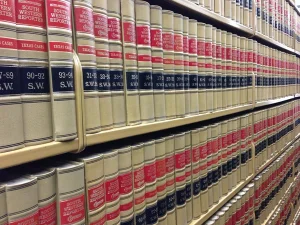
Why are asset protection attorneys so crucial today? When you’ve never had an issue with a lawsuit or had to face a financial crisis, it can be easy to think that you’ll continue to be safe. The reason why that thinking is dangerous is that most lawsuits don’t tap you on the shoulder and tell you they are coming. Know the first time most people know someone has filed a lawsuit against them? It is is usually when a big, ugly process server shows up at their home and office and puts legal papers in their hands.
Statistics show that the average person in the USA will see seven (7) lawsuits in his or her lifetime; even more for business owners. That is why this organization has many asset protection attorneys on staff. Not only do we have regular business people as clients. We also have many attorneys as clients as well. So, when an attorney wants to set up an asset protection structure for himself or herself, or his or her clients, many law firms will have us do the work.
The 10 most litigious states are California, Florida, New York, New Jersey, Illinois, Missouri, Pennsylvania, Michigan, Connecticut and Montana. Many attorneys from from these states have utilized the services of an asset protection attorney from this organization to secure assets for themselves and their clients. Our attorneys can go over the pros and cons of various asset protection plans. This organization also works with lawsuit defendants directly.

Why You Need Asset Protection
You run a good business. You keep your personal and professional assets above board and are an honest, hard working person. So, how could someone ever sue you? How could a creditor threaten you? It’s because it’s a lot easier to take money from a hardworking person like you that it is for someone to earn it themselves. As a result, many lawsuits come out of the blue. Many are surprises that, perhaps, you didn’t see coming.
So, knowing your asset protection options and taking action on them is simply a smart thing to do. So, here is why you need an asset protection attorney. You worked hard for your assets. You want to make sure than anyone trying to take them away has to work a lot harder. Therefore, with the proper legal tools, they wind up empty handed instead of you.
The truth is that bad things can still happen to good people. You may or may not have been lucky so far. The Legal Research Network has found that about 15 million lawsuits are filed in the U.S. each year. This means there is one new lawsuit for every one of 12 adults. Facing those odds every year isn’t good, and a single lawsuit can decimate everything you’ve worked so hard to build.
You do not have to lose everything, however. Setting up an asset protection plan now can save you the financial and personal stress you might face later.
Asset Protection Attorney Definition
To better understand what asset protection is, let’s start out by defining it. Asset protection is “protecting your wealth from anyone or anything that can take your money,” per the Asset Protection Society. So an asset protection attorney specializes in the arena of keeping others from seizing your wealth. Anyone with any significant amount of wealth should have a plan to keep that wealth safe. The earlier you start forming your plan, the better off you are. Once you are already facing a lawsuit, it is not necessarily too late. But the sooner you act the better. Don’t just sit around and be a victim. Take action.
You can employ asset protection strategies that are simple or complicated. The expense will vary depending on how much protection you need. Have a general understanding of your options. When you do, your talk with our financial professionals will be much more meaningful. Thus, you can more likely work together to create the best plan for your unique situation.
Threats to Your Assets
You may have a good reputation. Likewise, you may be careful with how you use your money. You may know you need asset protection but don’t have any immediate threats.
So, in a situation like this, do still you need asset protection security? It is because any individual or company has potential threats to their assets. This is especially the case for those with a lot to lose. On top of that, the threats don’t end with just lawsuits.
A financial news site called Money Crashers breaks down potential liability into two categories: professional and personal. For your business, lawsuits dealing directly with your products or services are a large part of professional liability. They include such possibilities as trademark infringement and breach of contract.
Your employees can also threaten your assets when something occurs in the workplace. They can hit you with threats like sexual harassment, employment discrimination, work-related vehicle accidents, and worker’s compensation. Your customers could file a claim of faulty products, malpractice, or having a “slip and fall” accident on your property.
In your personal life, things like divorce, debt, medical bills, and foreclosures are well-known risks to your assets. Other problems can come if you haven’t taken specific steps to separate your personal and professional assets. Employee actions and vicarious liability can result in lawsuits that threaten your personal assets as well. Say your business partner or employee has an accident. You can be held liable in an auto accident if you or your dependent drivers are uninsured or underinsured. If someone gets hurt on your property, regardless of if you were present, you might be liable. You may have a callable loan and your lender demands repayment immediately. The bank can seize your assets to cover the debt.

Most Common Causes & Reasons for Lawsuits
Below is a list of the some of the most common reasons why lawsuits are filed according to financial publication Money Crashers. Notice that many can be based on “he said she said” unfounded accusations and things you do not control. In other words, look how many of these are things that “happen to you” rather than things caused by you. Own a business? You cannot control someone making a false sexual harassment allegation against you. Nor can you control an employee claiming discrimination or hurting themselves or slipping and falling on purpose in order to get compensation.
Likewise, you do not control your spouse deciding to divorce you. You don’t control other drivers, or if someone walks onto your property and gets hurt. Moreover, you don’t completely control whether or not you come down with cancer or heart issues. Many wealth-sapping medical bills surpass the limits of insurance coverage.
| Professional Liability | Personal Liability |
| Trademark Infringement Lawsuits | Divorce |
| Sexual Harassment Accusations | Auto Accidents |
| Employment Discrimination | Social Host Liability |
| Faulty Products | Vicarious Liability |
| Malpractice Claims | Employee Actions |
| Breach of Contract Claims | Debt |
| Work-related Vehicle Accidents | Medical Issues |
| Workers’ Compensation Incidents | A Callable Loan |
| “Slip-and-Fall” Accidents | Foreclosure |
To protect yourself or your business from one of these liabilities, there are several different strategies you might consider.

Domestic Asset Protection Trusts
One of the most efficient ways to keep your assets out of the hands of creditors is with the proper trust. Transferring some of your assets to a trust run by an independent trustee can shield that asset for you or your children. It can even allow you to receive occasional distributions.
There are a variety of trust types available out there, in locations all over the world. Many people generally think only of the wealthy using offshore trusts. There are many options within the U.S. as well. Several states – including Alaska, Delaware, Rhode Island, Nevada, and South Dakota – allow asset protection trusts. Now, you don’t need to live in those states to take advantage of having a trust there. However, if you don’t live there the case law does not look promising, as we will discuss.
There are several requirements for setting up a domestic asset protection trust. First, the trust must be irrevocable. Next, it needs an independent trustee that is either an individual, bank, or company located in that state or country. Distributions are only allowed at the trustee’s discretion, and must have a spendthrift clause. The trusts documents, administration, and assets must be either partially or entirely located within that trust’s jurisdiction. State statutes do vary, however, so it’s best to check the laws of that state first.
Big Weakness With Domestic Trusts
The big weakness of domestic trusts is that their track record is not very good. The reason is that the trust may be in another state, but the settlor is under the jurisdiction of his or her local judges. So, most local judge will likely impose the local laws, not the laws of the state where that person formed their trust. Even within the state where the trust is formed, results-oriented judges have ignored the asset protection trust laws and have ordered the turnover of trust assets.
So, for the most powerful asset protection, set up an offshore trust. The trustee of the offshore trust is not bound by foreign court orders. Local judges do not have the legal authority to give orders to foreign trustees. So, experience has shown that offshore asset protection trusts have proven to be extremely effective. In fact, we believe we have set up more of them than any other firm in the world. They simply work.

Offshore Asset Protection Trusts
If you choose an offshore trust for your assets, some of the setup and provisions are the similar to a domestic trust. However, offshore (foreign) trusts offer a layer of protection you can’t get on your own soil: protection from the local courts. With your assets held offshore your assets are beyond their reach. Moreover, setting up such a trust can secure your assets and prevent the need for bankruptcy or other drastic measures.
There are two main benefits for offshore trusts. First, a judge in your country can’t compel a foreign trustee to provide a creditor access to those assets. Even if a creditor decided to pursue those assets, an expensive legal battle would ensue. Plus, your opponent must pursue them in that offshore jurisdiction, making this option unfavorable for the creditor. Second, the most favorable asset protection trust jurisdictions don’t recognize foreign court orders. Asset protection trust havens such as Cook Islands and Nevis ignore foreign judgments. So any action must be brought anew in a jurisdiction that does not look very favorably on judgment creditors.
Extra Security With Offshore Trusts
A foreign trust still allows you access to your assets while keeping them away from your creditor. It can also allow that foreign trustee to advise you on the best course of action to grow your assets within that specific trust. The difficulty and expense of securing an offshore trust will depend on that jurisdiction’s laws.
Is my money safe? How do I know the trustee won’t “run off” with my funds? Our international trustees are licensed, bonded law firms. They have long standing favorable track records. For example, a trustee in the Cook Islands undergoes an extensive background checks in order to obtain a license. They also carry insurance bonds, so trustee actions are covered by an insurance policy. Plus, we utilize trustees who have been providing such services for decades.
LLCs and Corporations
Operating businesses using limited liability companies (LLCs) or corporations has long been cited as a wise asset protection strategy. People used these tools for protecting personal assets from business liability. One of the reason for using an LLC to protect assets is that the creditor is often limited to a charging order against the membership interest. A charging order gives the creditor the right to receive distributions from the LLC that would otherwise go to the debtor. But it does not give the creditor access to the ownership of the underlying assets of that LLC. This is because the debtor’s controlling interest may limit distributions. As a result, the creditor may receive little to no actual payment.
In addition to asset protection, creating an LLC allows an individual or company to transfer assets in a tax-efficient manner. Moreover, it can minimize estate taxes, and offer controlled ownership transfers. For example, you can retain the controlling interest as LLC manager. At the same time, you can transfer membership interest to heirs in amounts below the gift tax limits.

Protecting Your Vehicle
Your personal or business vehicle is one of the riskiest assets you own. Accidents happen. Even if someone else is driving your vehicle, you will ultimately be liable. That is because a lawsuit can attack both the driver and owner of the car. If other property or persons are damaged because of an accident, you can be sued. Getting a comprehensive insurance policy on your vehicle is, of course, a good start. It is just that it might not be enough car asset protection. What if someone sues you for more money than your insurance policy will pay out? You could stand to lose a lot without extra protection.
Plus, with increasing competition to keep premiums down, there are more and exceptions included in insurance policies today. You would be surprised about the types of claims that insurance companies refuse to pay. Insurance companies are in the business of collecting premiums, not paying claims. So, policies are drafted to protect the insurance company, first and foremost, not you.
Limited Benefits of Insurance
Where your insurance policy ends, an LLC can cover the rest. For example, you can create an LLC and transfer the ownership of your personal or professional vehicle to that LLC. Thus, if someone else was driving, the defendant in the event of a lawsuit will be the LLC, not you.
Now, there are three main reasons to create an LLC for your vehicle. First, as indicated above, you may have one or more family members or third parties that you allow to drive your vehicle. As such, an LLC protects you from the liability of their accident. Second, you might own a vehicle that is used in your business. So, a separate LLC helps prevent someone from suing your business in the event of an accident. Third, perhaps your business owns a vehicle. Thus, you can transfer ownership of those vehicles to a subsidiary LLC. This arrangement can help prevent vehicle-related lawsuits from coming back to your company.

Asset Protection Attorney: Getting Professional Help
When you want to make sure that your assets are safe, make sure you’re doing it right by consulting a professional. It can be difficult to navigate the world of asset protection alone. So, having someone there to assist you can ensure that you have the most complete protection.
Per Lodmell & Lodmell, an asset protection attorney is a person that works with each individual or company to determine which plans, trusts, and business entities will best meet their specific situations. He or she looks beyond conventional legal practice to find the best protection for their clients. This is so, even if that protection is in a foreign jurisdiction. Thus, their main goal is to ensure that they set up legal tools that protect your assets from flaws in the legal system that might put you at risk in the future.
No matter which asset protection plan is right for you, starting your plan can save you pain when the worst happens to you. Don’t wait until it’s too late to protect yourself and your business! You can call the number above or fill out a free consultation form to speak with one of our in-house attorneys.
Asset Protection Attorneys by State
This organization serves asset protection attorneys and lawsuit victims directly. We perform services in the following states: California, Texas, New York, Florida, Illinois, Pennsylvania, Ohio, Georgia, Michigan, North Carolina, New Jersey, Virginia, Washington, Massachusetts, Arizona, Indiana, Tennessee, Missouri, Maryland, Wisconsin, Minnesota, Colorado, Alabama, South Carolina, Louisiana, Kentucky, Oregon, Oklahoma, Connecticut, Iowa, Mississippi, Arkansas, Utah, Kansas, Nevada, New Mexico, Nebraska, West Virginia, Idaho, Hawaii, Maine, New Hampshire, Rhode Island, Montana, Delaware, South Dakota, Alaska, North Dakota, District of Columbia, Vermont, Wyoming. If you hadn’t noticed, that is all 50 states. Please feel free to use the number or form on this page if you seek a direct conversation with a professional.



